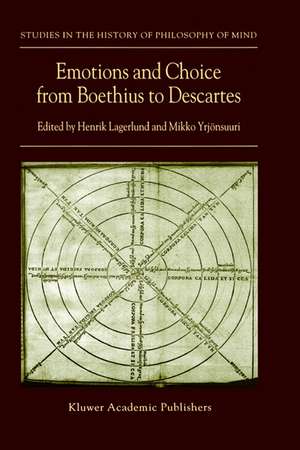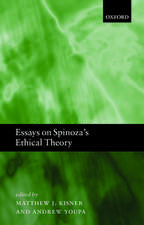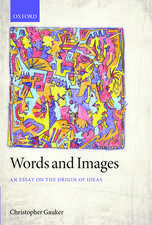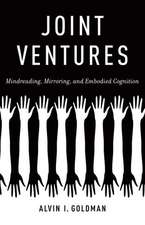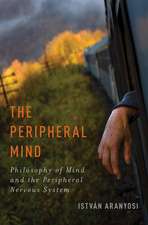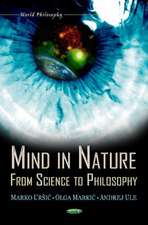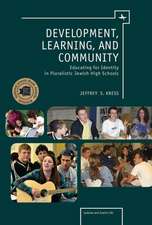Emotions and Choice from Boethius to Descartes: Studies in the History of Philosophy of Mind, cartea 1
Editat de Henrik Lagerlund, Mikko Yrjönsuurien Limba Engleză Hardback – 31 dec 2002
| Toate formatele și edițiile | Preț | Express |
|---|---|---|
| Paperback (1) | 643.34 lei 6-8 săpt. | |
| SPRINGER NETHERLANDS – 31 dec 2002 | 643.34 lei 6-8 săpt. | |
| Hardback (1) | 649.54 lei 6-8 săpt. | |
| SPRINGER NETHERLANDS – 31 dec 2002 | 649.54 lei 6-8 săpt. |
Din seria Studies in the History of Philosophy of Mind
- 20%
 Preț: 689.96 lei
Preț: 689.96 lei -
 Preț: 387.75 lei
Preț: 387.75 lei - 24%
 Preț: 1051.82 lei
Preț: 1051.82 lei - 18%
 Preț: 1571.77 lei
Preț: 1571.77 lei - 18%
 Preț: 731.91 lei
Preț: 731.91 lei - 20%
 Preț: 572.09 lei
Preț: 572.09 lei - 15%
 Preț: 653.79 lei
Preț: 653.79 lei - 18%
 Preț: 733.33 lei
Preț: 733.33 lei - 15%
 Preț: 481.34 lei
Preț: 481.34 lei - 15%
 Preț: 647.92 lei
Preț: 647.92 lei - 15%
 Preț: 582.45 lei
Preț: 582.45 lei - 15%
 Preț: 643.16 lei
Preț: 643.16 lei - 18%
 Preț: 785.42 lei
Preț: 785.42 lei - 15%
 Preț: 651.34 lei
Preț: 651.34 lei - 18%
 Preț: 721.19 lei
Preț: 721.19 lei - 15%
 Preț: 635.80 lei
Preț: 635.80 lei -
 Preț: 448.58 lei
Preț: 448.58 lei - 15%
 Preț: 695.70 lei
Preț: 695.70 lei -
 Preț: 383.93 lei
Preț: 383.93 lei - 18%
 Preț: 727.66 lei
Preț: 727.66 lei - 18%
 Preț: 720.53 lei
Preț: 720.53 lei - 18%
 Preț: 952.89 lei
Preț: 952.89 lei - 15%
 Preț: 695.85 lei
Preț: 695.85 lei - 18%
 Preț: 1390.26 lei
Preț: 1390.26 lei - 18%
 Preț: 953.35 lei
Preț: 953.35 lei - 18%
 Preț: 944.99 lei
Preț: 944.99 lei
Preț: 649.54 lei
Preț vechi: 764.17 lei
-15% Nou
Puncte Express: 974
Preț estimativ în valută:
124.31€ • 129.30$ • 102.62£
124.31€ • 129.30$ • 102.62£
Carte tipărită la comandă
Livrare economică 15-29 aprilie
Preluare comenzi: 021 569.72.76
Specificații
ISBN-13: 9781402009938
ISBN-10: 1402009933
Pagini: 354
Ilustrații: XI, 342 p.
Dimensiuni: 155 x 235 x 25 mm
Greutate: 0.67 kg
Ediția:2002
Editura: SPRINGER NETHERLANDS
Colecția Springer
Seria Studies in the History of Philosophy of Mind
Locul publicării:Dordrecht, Netherlands
ISBN-10: 1402009933
Pagini: 354
Ilustrații: XI, 342 p.
Dimensiuni: 155 x 235 x 25 mm
Greutate: 0.67 kg
Ediția:2002
Editura: SPRINGER NETHERLANDS
Colecția Springer
Seria Studies in the History of Philosophy of Mind
Locul publicării:Dordrecht, Netherlands
Public țintă
ResearchCuprins
Goodness and Rational Choice in the Early Middle Ages.- Medieval Theories of the Passions of the Soul.- Weakness of Will: The Plurality of Medieval Explanations.- Free Will and Self-Control in Peter Olivi.- Reflections on John Duns Scotus on the Will.- A Nominalist Ontology of the Passions.- Buridan’s Theory of Free Choice and Its Influence.- Emotions in Renaissance Humanism: Juan Luis Vives’ De anima et vita.- Late Scholastic Theories of the Passions: Controversies in the Thomist Tradition.- The Rationality of Cartesian Passions.- Descartes on the Will and the Power to do Otherwise.- Name Index.
Recenzii
"This is a long overdue series of studies on a very important topic. The essays in this first volume demonstrate the sophistication with which medieval and early modern thinkers addressed some perennial questions in the philosophy of mind, questions that are at the forefront of contemporary philosophical work in this field. At the very least, they bring out the continued relevance of doing philosophy historically."
(Steven Nadler, Professor of Philosophy, University of Wisconsin, Madison)
"Those of us, who like me have written about weakness of the will, and the emotions, without benefit of knowledge of medieval philosophy, have much to learn from this wide-ranging collection. From Anselm on sin to Vives on laughter, from theological to medical approaches, this book is crammed with riches."
(Annette Baier, Emerita Professor of Philosophy, University of Pittsburgh)
"[...]It is an excellent book, and I am glad to know of its existence [...] and I look forward to making use of it in my teaching and research."
(Eleonore Stump, Robert J. Henle S.J. Professor of Philosophy, Saint Louis University)
"[...] this collection is extraordinarily useful for philosophers who work outside the area of mediaeval and early modern philosophy. The contributors are well-known and the articles clear and accessible. As a whole, the book does much to open up an area of great interest. In recent years there has been a large amount of scholarly interest in emotions, their nature and role, in ancient philosophy. It is fascinating to find the continuation and development of similar debates in mediaeval philosophers. Outside the work of specialists, mediaeval philosophers tend to be seen disproportionately in terms of their metaphysical and theological interests, and this work helps to give a better view. It is also fascinating to see the relation of the mediaeval thinkers to Descartes; old ideas of a sharp break between `mediaeval' and `early modern' are increasingly seen as inadequate."
(Julia Annas, Regents Professor, Dept. of Philosophy, University of Arizona)
"...Though some essays are more history than philosophy, the collection nevertheless balances out and brings to the reader an in-depth study of what the editors rightly describe as a neglected field of research...it is highly recommended to those whose research deals with such topics [rational choice, free will, or weakness of will], or is in the field of the history of philosophy of mind."
(Kurt Smith Bloomsburg, University of Pennsylvania in Journal of the History of Philosophy, 42:1 (January 2004)
(Steven Nadler, Professor of Philosophy, University of Wisconsin, Madison)
"Those of us, who like me have written about weakness of the will, and the emotions, without benefit of knowledge of medieval philosophy, have much to learn from this wide-ranging collection. From Anselm on sin to Vives on laughter, from theological to medical approaches, this book is crammed with riches."
(Annette Baier, Emerita Professor of Philosophy, University of Pittsburgh)
"[...]It is an excellent book, and I am glad to know of its existence [...] and I look forward to making use of it in my teaching and research."
(Eleonore Stump, Robert J. Henle S.J. Professor of Philosophy, Saint Louis University)
"[...] this collection is extraordinarily useful for philosophers who work outside the area of mediaeval and early modern philosophy. The contributors are well-known and the articles clear and accessible. As a whole, the book does much to open up an area of great interest. In recent years there has been a large amount of scholarly interest in emotions, their nature and role, in ancient philosophy. It is fascinating to find the continuation and development of similar debates in mediaeval philosophers. Outside the work of specialists, mediaeval philosophers tend to be seen disproportionately in terms of their metaphysical and theological interests, and this work helps to give a better view. It is also fascinating to see the relation of the mediaeval thinkers to Descartes; old ideas of a sharp break between `mediaeval' and `early modern' are increasingly seen as inadequate."
(Julia Annas, Regents Professor, Dept. of Philosophy, University of Arizona)
"...Though some essays are more history than philosophy, the collection nevertheless balances out and brings to the reader an in-depth study of what the editors rightly describe as a neglected field of research...it is highly recommended to those whose research deals with such topics [rational choice, free will, or weakness of will], or is in the field of the history of philosophy of mind."
(Kurt Smith Bloomsburg, University of Pennsylvania in Journal of the History of Philosophy, 42:1 (January 2004)
Caracteristici
Showing in detail how old and new ideas were bred and brought into the Middle Ages, and how they resulted in a genuinely modern perspective in the thought of Descartes Includes supplementary material: sn.pub/extras
